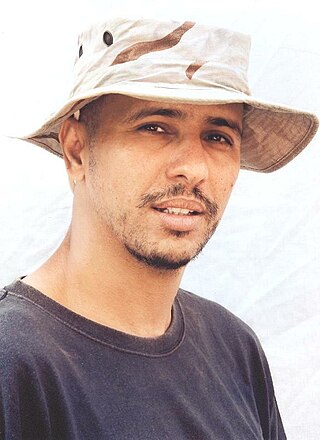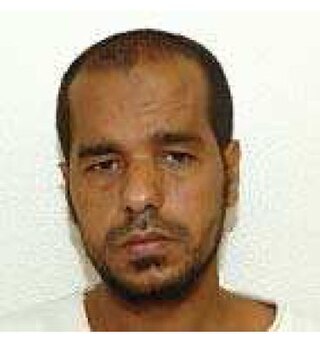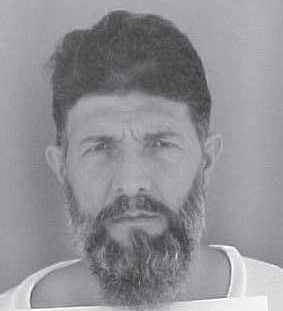Related Research Articles

Mohamedou Ould Slahi is a Mauritanian engineer who was detained at Guantánamo Bay detention camp without charge from 2002 until his release on October 17, 2016.

Salim Ahmed Salim Hamdan is a Yemeni man, captured during the invasion of Afghanistan, declared by the United States government to be an illegal enemy combatant and held as a detainee at Guantanamo Bay from 2002 to November 2008. He admits to being Osama bin Laden's personal driver and said he needed the money.

Omar Amer Deghayes is a Libyan citizen who had legal residency status with surviving members of his family in the United Kingdom since childhood. He was arrested in Pakistan in 2002. He was held by the United States as an enemy combatant at Guantanamo Bay detention camp from 2002 until December 18, 2007. He was released without charges and returned to Britain, where he lives. His Guantanamo Internment Serial Number was 727. Deghayes says he was blinded permanently in one eye, after a guard at Guantanamo gouged his eyes with his fingers. Deghayes was never charged with any crime at Guantanamo.
Asif Iqbal is a British citizen who was held in extrajudicial detention as a terror suspect in the United States Guantanamo Bay detainment camps in Cuba from early 2002 to 9 March 2004.
Menad Benchellali is a suspected terrorist arrested in France on January 6, 2004.
Nizar Sassi is a citizen of France who was detained by the United States in their Guantanamo Bay Naval Base, Cuba. His Guantanamo Internment Serial Number was 325.
Saad Madi Saad al Azmi is a Kuwaiti citizen. He was held in extrajudicial detention in the United States Guantánamo Bay detainment camps, in Cuba, and later repatriated on November 4, 2005. Joint Task Force Guantanamo counter-terrorism analysts report that al-Azmi was born on May 29, 1979, in Doha, Kuwait.

Khaled Ahmed Qasim is a Yemeni citizen who has been held in extrajudicial detention in the United States Guantanamo Bay detention camp in Cuba, since May 2002.
Adel al Zamel is a citizen of Kuwait who was held in extrajudicial detention in the United States Guantanamo Bay detention camps, in Cuba.
Imad Achab Kanouni is a French citizen who was held in extrajudicial detention in the United States Guantanamo Bay detention camps, in Cuba. Kanouni was captured in Afghanistan in 2001 and transferred to France on July 26, 2004. Under French law, detainees like Kanouni can be held, for up to three years, under the control of a judge.
Mohammed Saghir(also transliterated Mohammed Sanghir) is an elderly Pakistani who was held by the U.S. military in the United States Guantanamo Bay detention camps, in Cuba. His Guantanamo Internment Serial Number was 143. Joint Task Force Guantanamo counter-terrorism analysts estimate he was born in 1952, in Kohestan, Pakistan.

Jabir Jubran Al Fayfi is a citizen of Saudi Arabia who was held in extrajudicial detention in the United States Guantánamo Bay detention camp, in Cuba on allegations he trained and fought with al-Qaeda and the Taliban in Afghanistan in 2001.
Ahmed Adil is a citizen of China who was held in extrajudicial detention in the United States Guantanamo Bay detainment camps in Cuba.

Mohamed Atiq Awayd Al Harbi is a citizen of Saudi Arabia formerly held in extrajudicial detention in the United States's Guantanamo Bay detention camps, in Cuba. His Guantanamo Internee Security Number was 333. The US Department of Defense reports that he was born on July 13, 1973, in Riyadh, Saudi Arabia.

Zia Ul Shah is a citizen of Pakistan best known for the time he spent in extrajudicial detention in the United States Guantanamo Bay detention camps, in Cuba. His Guantanamo Internment Serial Number was 15.
Samir Naji al Hasan Moqbel is a citizen of Yemen who was held in extrajudicial detention in the United States's Guantanamo Bay detention camps, in Cuba. His Guantanamo Internee Security Number was 043. The Department of Defense reports Moqbel was born on December 1, 1977, in Taiz, Yemen.

Sabar Lal Melma was a citizen of Afghanistan who was held in extrajudicial detention in the United States Guantanamo Bay detainment camps, in Cuba. Sabar Lal Melma's Guantanamo Internment Serial Number was 801. American intelligence analysts estimate that Sabar Lal Melma was born in 1962, Darya-e-Pech, Afghanistan.
Khaled Ben Mustafa is a citizen of France who was held in extrajudicial detention in the United States Guantanamo Bay detainment camps, in Cuba. The Department of Defense reports that Mustafa was born on January 9, 1972, in Lyon, France. His Guantanamo Internment Serial Number was 236.

Mohammed Naim Farouq is a citizen of Afghanistan who was held in extrajudicial detention in the United States Guantanamo Bay detention camps, in Cuba. His Guantanamo Internment Serial Number was 633. Mohammed Naim Farouq is named on a "most wanted" poster issued by the Defense Intelligence Agency, and a press release entitled: "Ex-Guantanamo Detainees who have returned to the fight".
Brahim Yadel is a citizen of France who was held in extrajudicial detention in the United States Guantanamo Bay detainment camps, in Cuba. His Guantanamo Internment Serial Number was 371. Born in Aubervilliers, France, the Department of Defense has reported his date of birth.
References
- ↑ Jo Warrick (2004-05-04). "An Al Qaeda 'Chemist' and the Quest for Ricin". Washington Post . Archived from the original on 2016-10-18. Retrieved 2016-10-14.
- ↑ Margot Williams (2008-11-03). "Guantanamo Docket: Mourad Benchellali". New York Times . Archived from the original on 2016-03-04.
- ↑ Nizar Sassi: A French Detainee Waiting to Return Home Archived 2005-09-14 at the Wayback Machine , Northwestern University Medill School of Journalism
- ↑ French Push Limits in Fight On Terrorism: Wide Prosecutorial Powers Draw Scant Public Dissent, Washington Post , November 2, 2004
- 1 2 Steven Erlanger (2009-02-24). "Terror convictions overturned in France". New York Times . Paris, France. p. A5. Archived from the original on 2009-04-11. Retrieved 2016-10-14.
Mourad Benchellali, who was at Guantánamo, wrote an Op-Ed article for The New York Times in June 2006 in which he said that in 2001, when he was 19, 'I made the mistake of listening to my older brother and going to Afghanistan on what I thought was a dream vacation.'
- 1 2 Nicolas Vaux-Montagny (2010-02-17). "France orders 5 former Gitmo inmates back to court". Associated Press. Archived from the original on 2024-05-24.
- 1 2 Mourad Benchellali (2006-06-14). "Detainees in Despair". New York Times . p. A23. Archived from the original on 2014-02-28.
- ↑ Tom Lasseter (June 15, 2008). "Guantanamo Inmate Database: Page 2". McClatchy News Service. Archived from the original on June 20, 2008. Retrieved 2008-06-16.
- 1 2 3 Tom Lasseter (June 15, 2008). "Guantanamo Inmate Database: Mourad Benchellali". McClatchy News Service. Archived from the original on September 20, 2008. Retrieved 2008-06-16.
It was an al Qaida camp. Benchellali claims that he and Nizar had never heard of al Qaida and knew nothing about international terrorism. After they arrived, he said, they realized that the camp wasn't merely for religious studies and wasn't at all what they had hoped to find. In fact, all al Qaida camps were military training facilities.
- ↑ "Paris Court Acquits Former Guantanamo Detainees". Huffington Post. 2009-02-24. Retrieved 2009-02-24.
- 1 2 3 "Ex-Guantanamo inmates seek evidence from former US official". Middle East Eye. 2016-10-13. Archived from the original on 2016-10-13. Retrieved 2016-10-14.
Two French former inmates at Guantanamo Bay have called for a former high-ranking US Defence Department official to give evidence on their accusations of torture at the notorious US prison camp, the men's lawyer said on Wednesday.
- ↑ "Former Guantanamo detainees ask French judge to investigate torture allegations". Russia Today. 2014-02-26. Archived from the original on 2014-02-28. Retrieved 2014-02-28.
Two former Guantanamo Bay detainees asked a French judge Wednesday to subpoena a former prison commander they accuse of overseeing their alleged torture.